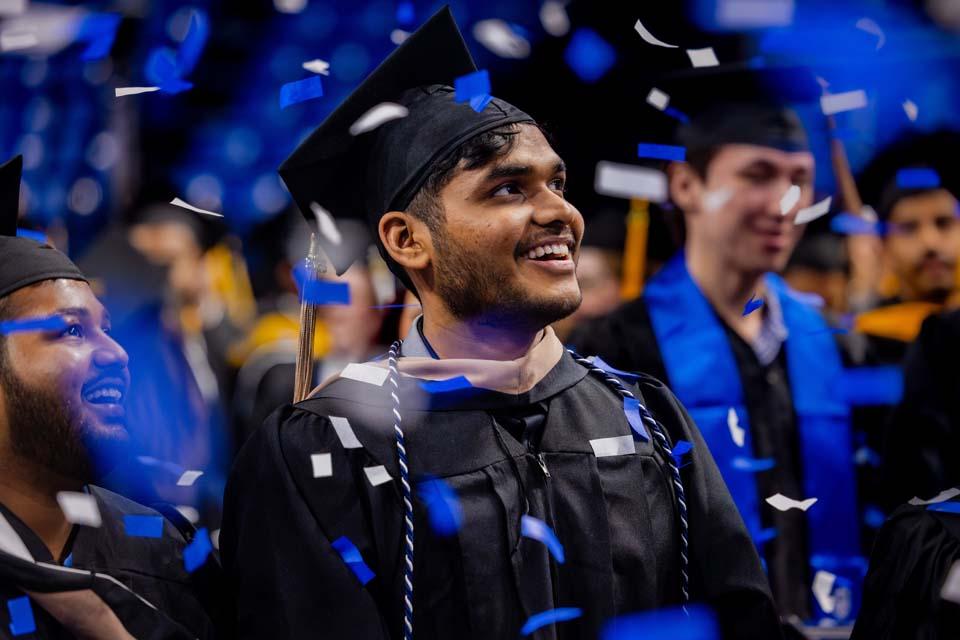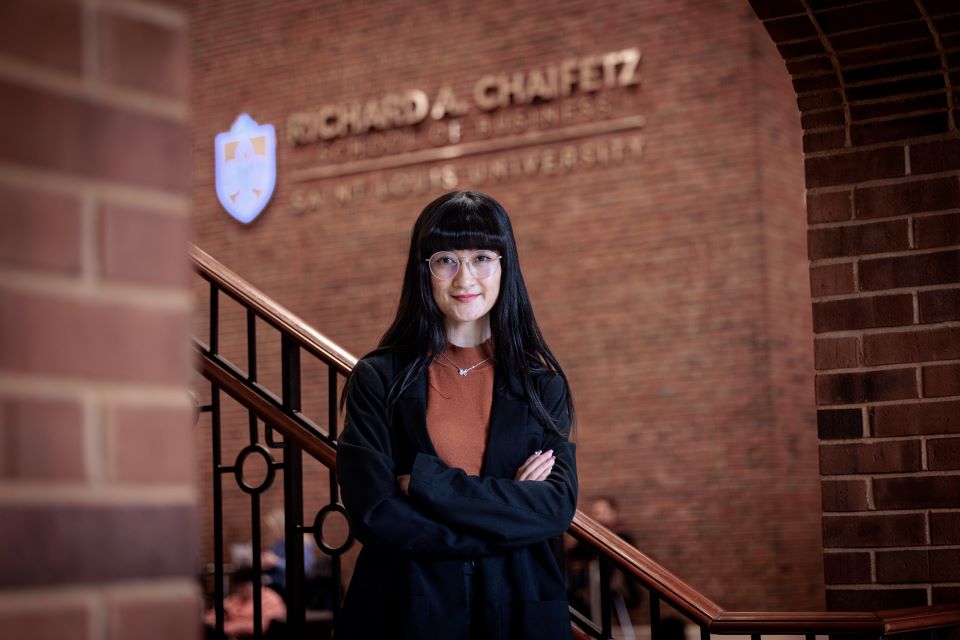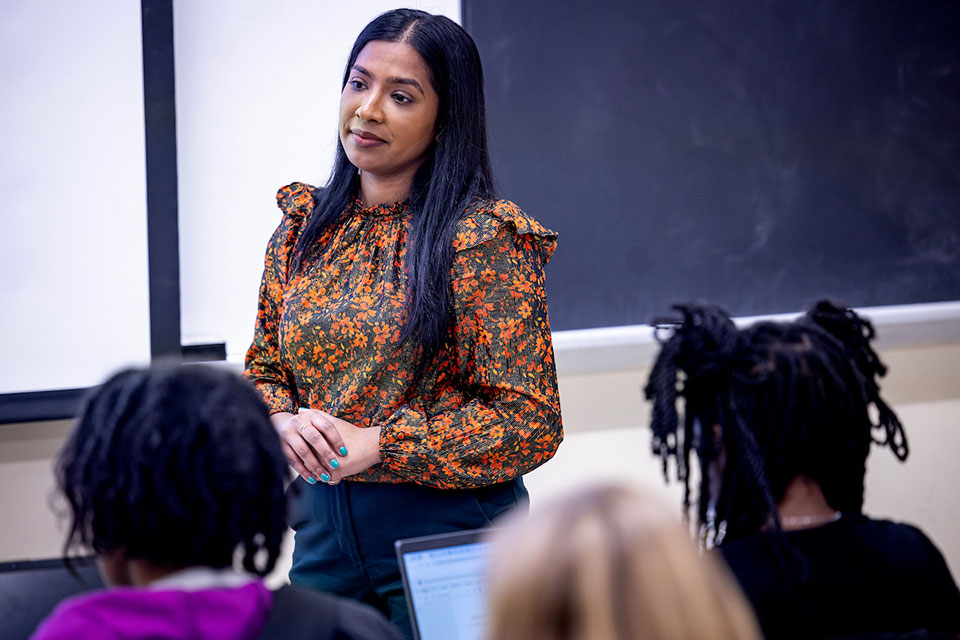Department of Energy Awards Saint Louis University Nearly $1 Million to Create a Climate Resilience Center
SLU's Climate Resilience Center is one of 10 projects in 10 states funded by the DoE
ST. LOUIS – Saint Louis University has received a $964,848 grant from the U.S. Department of Energy (DOE) to create a Climate Resilience Center at SLU. The project is one of 10 centers funded by the DOE in states nationwide. Funding was announced Aug. 15.
Orhun Aydin, Ph.D., assistant professor in earth and atmospheric science at SLU’s School for Science and Engineering, is the principal investigator on the three-year project, which brings together researchers from across the university working on issues around urban climate and how it impacts human health.
Co-investigators include Sarah Coffin, Ph.D., associate professor in urban planning; Emily Hite, Ph.D., assistant professor of sociology and anthropology; Benjamin de Foy, Ph.D., professor of earth and atmospheric science; Liz Hasenmueller, Ph.D., associate professor of earth and atmospheric science; Vasit Sagan, Ph.D., professor of earth and atmospheric science and computer science; Enbal Shacham, Ph.D., professor of behavioral science and health equity; and Jason Knouft, Ph.D., professor of biology.
The project, “Advancing Development and Climate-Resilient Adaptation Practices via Community-Driven Urban Transformation,” will undertake high-resolution modeling of heat islands in St. Louis City and St. Louis County and offer ways to build resilience into existing buildings and future developments.
Heat islands exist when high urban density causes temperatures in cities to rise above the temperatures in the surrounding, less-dense parts of the region. Heat is also one of the driving factors in premature deaths in Missouri.
Aydin said St. Louis’ unique climate resilience challenges and undergoing efforts for sustainability plans make here and now an ideal time to utilize generative AI to inform resilience plans for weather extremes by smart geodesign.
“Heat islands aren’t just about the temperature,” Aydin said. “In St. Louis, with our humidity, 90 degrees can be suffocating. The stress on those experiencing the heat is different.”
The research team will create a network of high-precision weather sensors in St. Louis City and County. The sensors will be built in Aydin’s AI-CHESS (Artificial Intelligence for Coupled Human-Environment System Analysis for Sustainability) Lab at SLU. The sensors will give the team access to real-time weather data in the region, allowing them to follow up with an AI model for high heat exposure based on climate models from the Department of Energy.
“We will be able to investigate the impact of green spaces and sustainable development,” Aydin said. “Increasing green spaces will reduce the impact of heat islands and improve shade equity to lower-income neighborhoods.”
In addition to the climate models, the research team will also evaluate the energy efficiency of homes within the heat islands of St. Louis City and County.
Community partner EnergyCare, a non-profit whose mission is to help low-income, vulnerable people find safety from extreme temperatures, will conduct home audits and provide assistance via better insulation or air conditioning units.
“Those audits are beginning now,” Aydin said. “We still have enough hot weather ahead of us this year to start.”
The audits will help determine how much power is needed to heat and cool homes.
The research team will use the data collected to create a neighborhood dashboard that will be shared with the city and county.
The Center benefits from a research team pulled consisting of a variety of academic departments at SLU. All eight members have research rooted in climate change but are each tackling it through the lens of their own expertise.
The team also brings in strengths from the institutions they represent, in particular, Taylor Geospatial Institute and the WATER Institute at SLU.
Coffin, director of SLU’s urban planning and development program, brings expertise in urban design to aid in future development plans. Hasenmueller and Knouft, both members of SLU’s WATER Institute, will look at how to create more green spaces that can withstand the flooding and drought conditions that the region can face.
Looking at people’s perceptions and experiences with heat will fall to Hite, an anthropologist, while Shacham brings a public health and equity lens to the project.
“We have a wide variety of expertise among the investigators,” Aydin said. “They each make up an important aspect of the project. Our government and community partners will also be an integral part of the final action and implementation of any research findings.”
Saint Louis University
Founded in 1818, Saint Louis University is one of the nation’s oldest and most prestigious Catholic institutions. Rooted in Jesuit values and its pioneering history as the first university west of the Mississippi River, SLU offers more than 15,200 students a rigorous, transformative education of the whole person. At the core of the University’s diverse community of scholars is SLU’s service-focused mission, which challenges and prepares students to make the world a better, more just place.
Latest Newslink
- Saint Louis University Joins Multi-Disciplinary Research Team to Enhance Stress Resilience in SorghumSaint Louis University is part of a multi-disciplinary team, led by the Donald Danforth Plant Science Center, to deepen the understanding of sorghum, a versatile bioenergy crop, and its response to environmental challenges.The U.S. Department of Energy (DOE) Biological and Environmental Research (BER) program supports the three-year $2.5 million project for Genomics-Enabled Understanding and Advancing Knowledge on Plant Gene Function. Saint Louis University will receive $437,039 for its portion of the study.
- SLU Graduates Celebrated at Midyear CommencementSaint Louis University celebrated its Midyear Commencement on Saturday, Dec. 13, inside Chaifetz Arena. More than 1,900 guests watched as 600-plus SLU students walked across the stage and left as graduates.
- Why Do Raccoons Cross the Road? SLU, St. Louis Zoo Research Shows They Don'tA new study led by researchers from Saint Louis University, the Saint Louis Zoo, and partner organizations set out to understand how raccoons use space in one of the nation's largest urban parks.
- Structurally Sound: Two Gingerbread Houses Built by SSE Students Hold Up Under 100-Plus Pounds of WeightTeams of students, faculty and staff in Saint Louis University's School of Science and Engineering recently put their engineering skills to work for a December Innovation Challenge, building gingerbread houses designed to stand up during a weight-loading competition.
- Saint Louis University Student Speaks at Ignatian Family Teach-In for JusticeSaint Louis University senior Sahar Hussaini shared her views on fast consumerism and why she believes in Catholic Ethical Purchasing at the 2025 Ignatian Family Teach-In for Justice. The event, held annually in Washington, D.C., is the nation’s largest Catholic social justice advocacy day.
- SLU Commits up to $1.5 Million to Support Local Students Pursuing Social Work and Criminal Justice CareersThe new initiative — representing a commitment of up to $1.5 million in scholarship support over the next several years — is designed to strengthen the region’s social work and criminal justice workforce by expanding college access for talented local students.













